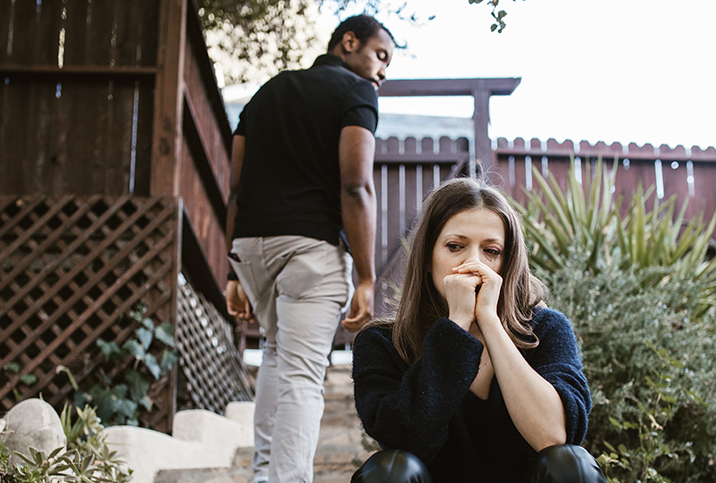Forget the Hot Texts, the New Thing Is 'Fexting'

Technology is reshaping many relationships. Love letters have been replaced by a virtual neon sign over an avatar photo of you which confirms you're present (online) and ready to respond, even if it's not your best moment.
Since the phone is essentially a new appendage, it's no wonder you go through different responses according to your mood. One moment you send emoticons of kisses and heart eyes to your partner, but when you're angry, the situation can switch to hurtful words flowing through your fingers—and you may not know how to stop it.
Private chat fights, or "fexting," are neither inherently bad nor good. As with many aspects of technology, how you use them is up to you. Just be careful and learn how to use this communication tool so it works in your favor.
In fact, discussions in WhatsApp can contribute to the well-being of your relationship, said a 2021 study published in New Media & Society. So your cellphone not only heats up your relationship through sexting but can also relieve tension in fights, as each person uses and responds differently.
The researchers focused on a group of people from Generation X who adapted to the digital world later in life, though fexting doesn't exclude other generations, since it's common for everyone who has a cellphone to use different digital resources in their relationships.
Is fexting healthy?
"We often speak before we think, so texting to share how you feel and put it into words for a partner can be more productive than going in circles reacting to one another," said Shannon Chavez, Psy.D., a psychologist and sex therapist based in Beverly Hills, California.
Writing brings advantages, as you can review the text to ensure you know what you want to say, Chavez added. Along the way, you're able to understand more calmly the context and the message you are receiving from your partner.
"Using WhatsApp or any other app, text [or] social media for this reason could be beneficial, but you want to consider why you're struggling with shouting, interrupting, etcetera," said Emily Simonian, M.A., a licensed marriage and family therapist in Washington, D.C., and McLean, Virginia.
"If you use the app to avoid those communication issues, you risk never learning valuable communication skills," she said. "Additionally, so much is lost in communication via text, like facial expression, body language and intonation, it's easier to misunderstand each other."
However, Chavez explained that in-person conversations can be triggering, because you feel more reactive to aspects such as tone of voice or body language. She noted that text messages may give you space to process information and ask for clarification if necessary.
In any case, successful exchanges will depend on your interpretation and communication skills. If you're in a fight, it's very easy to perceive the words in a negative and aggressive way, as you are predisposed to a possible offense.
Why are chat fights common right now?
Just as you have different ways of using technology, the reasons are also diverse. For first lady Jill Biden, text message discussions became an alternative to avoid fights in front of the Secret Service. She admitted in an interview that she turned to the resource to keep business with her husband private.
Other people choose WhatsApp over other chats because the messages are encrypted and can't be used in a court of law. In such a digitized world, where your videos, photos and text might haunt you for a lifetime, it becomes a smart alternative to watch your back.
Hiding behind your cellphone?
Although text messages can help calm the atmosphere, you should be careful not to start a problem-avoidance attitude. Instead, strike a balance. The idea isn't to avoid deep, face-to-face conversations forever, but you could use fexting sporadically.
"Consider what your triggers are that keep you from wanting to have face-to-face conversations, and address those triggers with the person you're communicating with and with yourself. Or a therapist," Simonian said.
If you still choose to use an app, make sure you're practicing good communication habits, she advised, including the following:
- Make sure you understand what's being said
- Don't jump to conclusions
- Pause before reacting
- Reflect on what was said
- Don't revert to name-calling, contempt, defensiveness, ignoring, blaming or shaming
When the fight goes public
Nowadays, a large part of many people's lives is spent on social media, making it easy to cross the line between private and public. Remember, you can benefit from technology, but avoid overexposing your relationship.
"A private text conversation is different than expressing feelings online publicly," Chavez explained. "Feelings can be irrational, and an impulsive post about your personal problems may be disrespectful to a partner and a breach of trust."
"There are a lot of emotional risks when you share personal details about a relationship 'in public,' aka social media," Simonian added. "You are inadvertently, or maybe even purposely, inviting other people into the conversation or soliciting public opinions, and that can erode trust within the relationship."
Airing personal issues online is risky. Simonian and Chavez recommended the following guidelines for couples:
- Decide on boundaries
- Have consistent online behavior, after mutual agreement
- Learn how to handle the exchange of personal information
- Learn to compromise to build trust
- Talk about online behavior generally and understand the effect it can have
"It's OK to connect with others going through similar concerns, but stay away from public announcements which open you up to judgment and criticism [or] opinions of others," Chavez advised.
Learning to set boundaries
Alex Cooper, the host of the "Call Her Daddy" podcast, mentioned during a recent interview how she learned to set limits. She explained that she sometimes revealed too much in online comments about her expectations before her first date with someone. As the relationship progressed, she realized she wanted to keep many details private.
For her, through her work, it's important to be open about topics such as sexuality and mental health. However, she said she regretted sharing a discussion with her partner on her platform. After that, she decided to wait to have a better perspective on what is useful for her audience and what she needs to keep private.
Public eyes on your sex life
"Making your relationship public opens up the risk of people's comments and criticism," Chavez said. "It also breaks the bond of intimacy to share outside of the relationship and can be embarrassing and hurtful for both partners."
Angry messages are all over the internet. From hurtful comments to celebrities on Instagram to TikTok videos about dating gone wrong. While it can feel cathartic, think twice before speaking publicly about your relationship, as it could ruin future romances and your sex life in general.
"When intimacy is compromised with trust issues, sex becomes more challenging for couples," Chavez added. "There will be distance and resentment that builds up over time and leads to sexual avoidance or lack of desire."




















